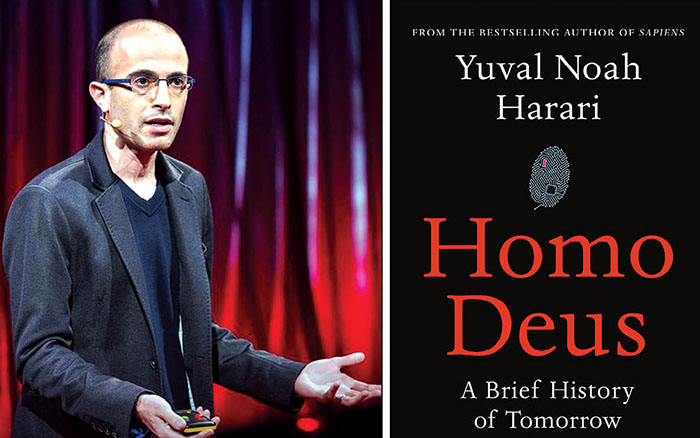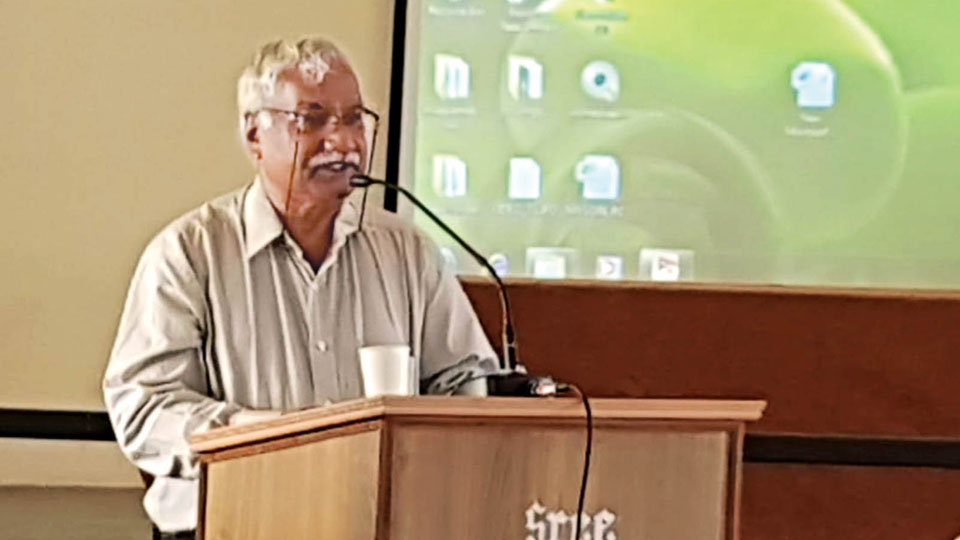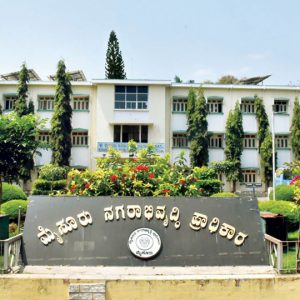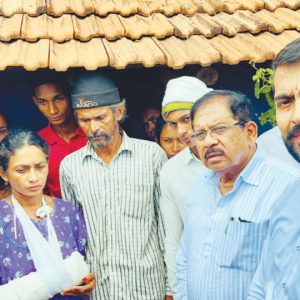- Former City Police Chief Chandrashekar speaks on the book Homo Deus
- In 21st century Sugar is more dangerous than Gun Powder
Mysuru: Former Mysuru City Police Commissioner, C. Chandrashekar, a student of English Literature and a keen student of History, recently gave a talk on the book ‘Homo Deus’ by Y. N. Harari.
Chandrashekar was trying to understand a few uncomfortable questions that Historians like international best-selling author Y. N. Harari pose. Questions like, “What is the relationship between history and biology? What is the essential difference between Homo Sapiens and other animals? Is there justice in history? Did people become happier as history unfolded?
He tried to answer these questions at the ‘Book Talk’ organised by Mysore Literary Association (MLA) at Sree Cauvery First Grade College in Kuvempunagar on Sunday last on the book titled “Homo Deus: A Brief History of Tomorrow” by Yuval Noah Harari.
He took the very intellectual audience gathered, through his very well structured power-point presentation, for nearly an hour about some of the interesting questions raised by Harari in the book like moving from abstract ideas to scientific advancements, politics, humanism, consumerism and liberal attitude.
Dwelling a little on the previous book by the same author, titled “Sapiens: A Brief History of Humankind,” which in fact was reviewed by Prof. M. Umapathy, retired professor of Political Science, University of Mysore, in the Mysore Literary Association’s ‘Book Talk’ a few months back, Chandrashekar talked about the 70,000 years history that Harari discussed in that book that also talks about cognitive revolution.
Do revolutions bring happiness? Giving the three examples of revolution, Chandrashekar recalled, the beheading of King Charles, the French Revolution and Russian Revolution and said revolutions did not bring one happiness as Dr. Zhivago, painfully concludes, “Did we have to suffer so much?”

Y. N. Harari. Picture right: Cover page of the book Homo Deus.
Explaining about how 21st century looks at evolution, he said, what was earlier accepted as natural selection is not of God but by humans and today the replacement of natural selection is by three ways, biological engineering, cyborg engineering and the new age of non-organic evolution where the outside object becomes part of human body.
Then he posed a question which has ethical, social and political implications — does one look at DNA or CV (curriculum vitae) when one selects a person for a job for instance. And then points to how Harari asks the question, can we not monitor a benign Frankenstein which further leads to robotics and then leaps to 2050 where man becomes Amoral. With so much of churning taking place, the question that needs to be answered is, “Is there anything more dangerous than dissatisfied Gods who don’t know what they want?” as the Homo Sapiens are on the verge of becoming Gods.
Turning to the book Homo Deus which means, man of God, the new agenda here is machines guiding human life. Giving the examples of the books 1984 by George Orwell, Brave New World by Aldos Huxley, 2001 Space Odyssey by Arthur C. Clarke, A Clockwork Orange by Anthony Burgess and Future Shock by Alvin Toffler, he said humanity is affected with three problems, famine related to starvation, plague to epidemic and war to violence.
But as Harari argues in the 21st century, more people die of over-eating than eating too little, of old age than infectious diseases, more people commit suicide than are killed by soldiers, terrorists and criminals combined and sugar is more dangerous than gun powder, said Chandrashekar.
Since the life expectancy has doubled from 40 to 70 years, there is also a change in moral values regarding marriage and profession for instance and the interesting question that is asked is ‘Do I have to keep reinventing myself?’ And then he wonders about the understanding of the future only through “Algorithms” by giving the example of Munich Airport where everything is done by the computers with hardly any human intervention.
Talking about the emergence of humanism leading to liberalism, he reflects on what answers could be given to the unprecedented gap between the rich and the poor, impact of designer babies and on when it comes to robots or soldiers, the ethical question that one asks will it commit rape?
Just pointing to the immediate future, Chandrashekar points to Harari’s prediction that most jobs could be replaced by 2033 and school syllabus could become irrelevant in the next 40 years. The effect of all this could be that the new religion could become Dataism moving from Humanism where the new world is nothing but techno humanism.
Chandrashekar concluded his talk with the three telling images of the ending of II World War where a sailor on hearing its ending just grabs a nurse on the streets of New York and kisses her passionately and also of the telling image of a refugee child washed ashore. He ends singing ‘Imagine’ by John Lennon followed by a brief interaction.
Earlier, Prof. K.C. Belliappa, President of Mysore Literary Association, welcomed.
Former IAS Officer A.K. Monnappa introduced Chandrashekar. MLA Secretary Reginald Wesley, former CRPF Inspector General of Police K. Arakesh, Star of Mysore Editor-in-Chief K.B. Ganapathy, Mysore Grahakara Parishat’s Ashvini Ranjan, Prof. M. Umpathy, Book Club 2015 Trustee Kitty Mandana, Dr. Latha Muthanna, Prof. Krishna Manavalli, Department of English, Dharwad University, Anuradha Nandakumar of Namana Kalamantapa and others were present.








Recent Comments